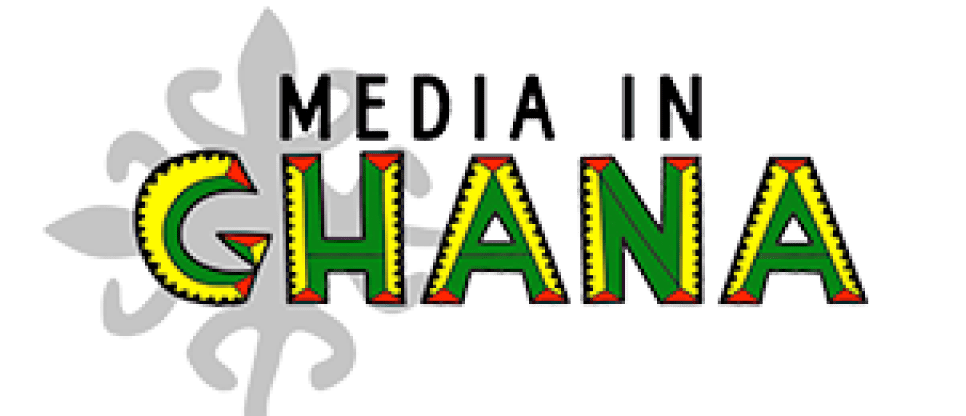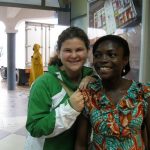Oh my home, you have brought me sadness 7,452 miles away.
I am interning at a radio, television and online publication called Joy, here in Ghana. In the newsroom, CNN plays on the television, helping everyone to stay updated on global news. Today, CNN was reporting that two African Americans had been shot and killed by police officers in the U.S. Everyone shook their heads; I could only imagine what they were thinking. The word “shameful” echoed throughout the room. Conversation and uproar sparked, questions about the force and America were thrown at me. This simple question stood out to me, “Why?” I was frozen with emotion, fear and guilt. I could not answer their questions and I wondered if any American could.
Last night, I was walking to dinner with a few of my Oregon classmates when we saw a mob of people flooding the streets. A fight, I first thought. But I was mistaken when moments later, two police officers emerged from the sea of people holding a young man in handcuffs. Their machine guns raised, faces stern, the officers looked prepared for battle. Naturally, I felt fear. Fear because I have never seen an official police officer with such a destructive weapon, let alone waving it around, fully equipped in what I would assume could only be battle gear.
When it comes to petty crimes, such as stealing, the citizens of Ghana take matters into their own hands. Ghanaians look out for one another. When a thief is spotted stealing, the public will come together and chase the criminal down. After capture, if the thief is fortunate enough, some call the authorities to handle the rest. Others, however, will handle the situation themselves, in a much more extreme approach, by beating or sometimes burning the culprit.
This particular young man that authorities had to fight a crowd of people to arrest had stolen a single apple, according to other spectators around me. What surprised me most about the encounter was the lack of fear from the surrounding Ghanaians. As Americans, we instantly felt uncomfortable at the sight of the machine guns. I questioned whether this was due to the lack of trust in our police officers or if we are just not accustomed to the way this culture handles crime.
After talking to my coworkers here at Joy, I found it to be rare that you hear a case of an officer shooting anyone. They are not trained to shoot with the intent to kill and rarely does it seem that they feel the need to use their lethal weapons. As Americans, the assumptions we made due to the decorations the officers sported made me upset as well, going back to the root of our problems, the judgments we subconsciously make formed in a society not equal for all.
Now, I am not saying the Ghanaian police officers are all martyrs. There are rumors in Ghana claiming that members of the force are easily bribed in order to get out of lesser crimes, but this does not seem nearly as corrupt as the idea of those trained, decorated and responsible for protecting its people being the ones committing the most violent crimes.
Ghanaians seem void of the same uneasy feeling that many Americans have when authorities are in the vicinity. Ghanaian police have lethal, automatic machine weapons that do not strike fear in the minds and bodies of their citizens like a police officer with a handgun in America. On top of that, the Ghanaian police do not have second options like tasers or mace, such as the members of our American police force.
When I make these comparisons of authority figures who are supposed to keep the peace, I see that they are failing in different ways and reflecting different problems within both of our societies, but these problems do not stop here. They go deeper. There are negatives to both police institutions. One hinders the promotion and ability to grow, creating easy access to corruption, and one is in the spotlight for taking innocent lives. But where are the solutions for both of these? Very different places and cultures in need of a solution, but both know the start of the problem comes from somewhere higher up.
I have sat on this post for a while, and in that time there have been gunshots at nonviolent protests and more innocent lives have been taken. CNN still plays videos of Americans being shot at and killed. Are we not asking the right questions? Or are we not receiving the honest answers? Where did our force go wrong? Who justified the training of our officers to shoot with the intent to kill? I speculate that the police have been mistreating African Americans for numerous years, but these altercations have gone unreported because no one has been held accountable. With social media and smartphones, the world has become so integrate. The truth will reveal itself, but how many more lives have to be taken in order to see real change?
I know very little about the training and the minds of police officers, making it hard to be critical and know exactly what questions I should be asking. Where is the root of this problem? I venture it is the institution we are a part of and the institutionalized racism many Americans of all ethnicities experience.
To break it all down, the majority of Americans are immigrants from past generations; one race does not deserve to live here over another. So why do we hold Whites to a higher standard? How do we fix the system, so that when we train our younger generations in their fields of expertise, the question of race is no longer an issue?
How do we go back to ‘protect and serve?’ How does the public change their reactions to the police? In the media, we see the police force and the American public as two different sides. As if this war is against each other. From my point of view, this fire should be pointed at our government. Are the force and the public capable of working together to stop crime, racism and all things evil for a better quality of life for everyone?
The problems in both Ghana and America trickle upward, and they affect more than just the police force but also the people of the countries this is happening in. In both cases, they represent a small opening into a bigger issue. In Ghana, there is a problem of bribery and the rumors that the government is easily swayed by money; in America, there is racism that is so deeply rooted in our history. These are beacons, calls to action, cries for help we must pay attention to. To think that it is only our police force that has lost its way to justice is absurd. People are being mistreated everywhere. We need to look at ourselves, at our professions and at our institutions in order to start the forward movement. I have hope.



Comments by jaclynr